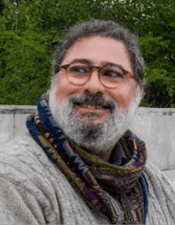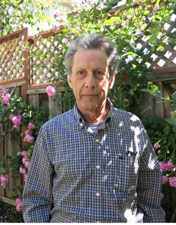Translated from the Italian by Donald Stang and Helen Wickes
(Claude Levi-Strauss, Tristes tropiques)
Exposed and unprotected at thirteen, and cold, even though hidden under a wool blanket – in my hands a flashlight and a book by Schopenhauer, while I listened to the deep breathing of my grandmother immersed in her chemical sleep – I read, frightened, “Human life is like a pendulum which oscillates incessantly between boredom and pain, with fleeting intervals, for the most part illusory, of pleasure and joy…. Enjoyment is only an imperceptible transition point in the slow oscillation of the pendulum.”
In the next room, my grandfather Celso spent his sleepless nights fighting and coming to terms with trigeminal neuralgia, a savage and monstrous pain which whispered invitations to suicide. Every hoarse and trembling cry was, for me, a new exclamation point to the certainties of the German philosopher.
Early in the morning, still dull and achy, I put on the beige uniform of the Dom Bosco school, and the heavy blue jacket, and left to doze at my school desk, with my notebook open in front of me and my eyelids closed, until I was caught by a stricter teacher, either Colonel Malebranche, behind his enormous square black eyeglasses – we never succeeded in seeing his pitiless gaze – or Boca Murcha (‘Withered Mouth’), the French teacher, whose passé composé rolled gelatinously from his tongue to his chin. He would call me by my first and last name, the only way of dragging me back from that other dimension.
And in this way passed the days and nights of an adolescence which seemed rather a pantomime of old age. An adolescence of days far away from maternal love and still devoid of the love of peers, and therefore dry, cold days, of a directionless, meager expectation, leaving me fearful that the dreariness of the present would thicken into the black hole of the future.
All this when I was stuck to the earth, but never when I travelled the Brazilian skies alongside my Uncle Ney, in his little Beechcraft J35 Bonanza which, when it took off and pulled me from the world, would erase Schopenhauer and every pain and boredom, change space, turn the world upside down and stop time. Momentum and ecstasy all at once, these flights prepared my spirit to free itself of my body, the complete liberation from the fear of non-being, from whatever possible fear.
Uncle Ney, a former pilot with Panair do Brasil, had been forced to retire many years earlier than he had planned because of the bankruptcy and dissolution of the airline he was working for. He had gotten a good settlement and decided to go into business for himself, buying the Bonanza, which he had learned to understand in its every sound, mood and quiver — the third plane in his life, after his apprenticeship in a Curtiss Fledging biplane, the “Frankenstein” of Correio Aereo Nacional, with which he had flown thousands of miles before being approved by Panair to pilot a large Model 10 Electra. Having abandoned the suit and tie and back to his old coveralls and the Bonanza, he returned to his beginnings and his little plane, which he rented to ranchers visiting the capital or to local politicians making a pilgrimage to see the generals. He also sometimes used it to fly people who had suffered gunshot wounds or seriously ill rich people to the local hospital. Sometimes he would be asked to fly medicine, whiskey, or some pretty call girl to some isolated village where money managed to arrive by strange routes but then just sat there without one knowing where it would end up or what it was for.
He travelled on board his Bonanza only once or twice a week. The other days he spent smoking his pipe and watching the clouds from the veranda of his house near the airfield or doing maintenance on the plane. On perfect days, however, he came in his little van to pick me up from home early in the morning before I left for school, or a little later in the morning on Sundays, under the uneasy gaze of my grandmother who after all had never believed that something heavier than air could fly, yet couldn’t bring herself to deprive me of that taste of happiness among the mountains and the clouds.
A minute after takeoff, the universe was already transformed, the sun was on the rivers, and the kites seen from above were little colored pennants on the bright green of the fields or the darker green of the forests.
The gigantic colored balls alongside of us were not hot air balloons, but flocks of birds moving in the sky, often changing direction: the green swarms of parrots, the reds and blues of arara macaws, the oranges of the sabiá, or the blacks of the anu. A sky that was more crowded than the earth below, which seemed almost deserted, with only some rare white ox grazing and some occasional little truck bouncing along the dirt roads.
Looking up above, the skyscape was spectacular. Upside down mountains of round clouds, white on the edges and gray inside. Around the gashes that let the sun’s rays through, you could see the glimmering golden frame of an intense yellow, with shades of pink and purple. Higher above, distant clouds, frayed, separated the world from the cosmos, a sort of misty mesh which served as the boundary of our flights. Below on the plain the horizon was lightly curved, letting you sense you were above a gigantic sphere. There, earth and sky blended into each other, behind a sheet of violet crowned with reflections of gold.
Uncle Ney, a gentle man of few words, ever so often would turn his head to look at me and smile, complicit in my amazement and satisfied by my surprise. I think he knew what those flights meant to me, the degree of consolation which they brought me after the long immersions in the pain of others, traversing adolescence half asleep without glimpsing the other shore. To fly near the clouds, among the colored swarms, was also a potent message: that it was enough to rise above the ground for everything besieging us to disappear miraculously, the most opaque reality dissolve into an inoffensive illusion, and for every threatening impediment to appear in miniature, every edifice a toy.
When we touched down again in the airfield we returned to a domesticated world, which for a little while no longer roared, but meowed. I walked alongside my uncle and the ground wobbled lightly under our feet, uncertain whether it was solid land or ocean, perhaps humiliated by that limitless sky.
Later, naturally, even my adolescence passed, and the flights ceased. Other lands arrived, other cities, and the solitude of those years has remained filed away in my memory, preserved but innocuous, a symbol of pain but no longer painful.
Of Uncle Ney I have had little news over the years, and of our Bonanza none. A cousin wrote to me one day telling me that he had died at home, from a heart attack. For some time I was overcome, and silently wondered whether he had not taken with him all that sky, if he hadn’t closed that door behind me.
Then, cured of my pain and boredom, thanks to more interesting chapters of my life, I wondered if Uncle Ney had truly existed, if the red and white Bonanza had really been his, if we had really flown together one day. And then I remembered that behind my grandparents’ house there was a hill, which on sunny days I would climb to the top where I could look out on the valley, the house, the dull scenario of my life, but mainly where I would look at the sky, the clouds with their long golden edges, the flocks of birds; and where every so often some little plane would appear, having taken off from a nearby airfield, pass above my head, and having caught me there alone, carry me away with it.
We gratefully acknowledge the assistance of Pina Piccolo.
__



 Four books of Helen Wickes‘ poetry have been published: In Search of Landscape (Sixteen Rivers Press, 2007); Dowser’s Apprentice and Moon over Zabriskie (both Glass Lyre Press, 2014); and World as You Left It (Sixteen Rivers Press, 2016). Her work has also appeared or is forthcoming in The Dreaming Machine (thedreamingmachine.com) and Sagarana (sagarana.net), among many other publications. She is a long-time member of Sixteen Rivers Press, a small, non-profit poetry press.
Four books of Helen Wickes‘ poetry have been published: In Search of Landscape (Sixteen Rivers Press, 2007); Dowser’s Apprentice and Moon over Zabriskie (both Glass Lyre Press, 2014); and World as You Left It (Sixteen Rivers Press, 2016). Her work has also appeared or is forthcoming in The Dreaming Machine (thedreamingmachine.com) and Sagarana (sagarana.net), among many other publications. She is a long-time member of Sixteen Rivers Press, a small, non-profit poetry press.























What a pure jewel.